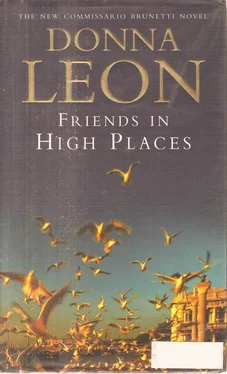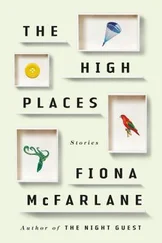‘Signore,’ Brunetti finally said.
The man’s eyes opened, and he looked up at Brunetti. His eyes were a deep brown and made Brunetti think of bears, but that might be because of his general thickness. ‘She told me not to come,’ he said. ‘She said it was a trap.’ He blinked, keeping his eyes closed for a long time, then opened them, and said, ‘But I was afraid. I heard people talking about the story, and I was afraid.’ Again, that long, timeless closing of the eyes, so long it seemed that during it the man went off to some other place while they were closed, like a diver beneath the waters of the sea, happier to remain amidst that greater beauty and reluctant to return.
His eyes opened. ‘But she was right. She always is.’ Saying that, he sat up. ‘Don’t worry,’ he said to Brunetti. ‘I won’t hurt you. I need the doctor to give me the cure, and then I’ll come with you. But first I have to have the cure.’
Brunetti nodded, understanding his need. ‘I’ll get the doctor,’ he said, and went out to the nurses’ station, where Carraro stood, talking on the phone. There was no sign of the nurse.
When he saw Brunetti, he hung up and turned to him. ‘Well?’ The anger was back, but Brunetti suspected it had nothing to do with any violation of the Hippocratic Oath.
‘I’d like you to give him a tetanus shot, and then I’ll take him to the Questura.’
‘You leave me alone in a room with a murderer, and now you expect me to go back in there and give him a tetanus shot? You’ve got to be out of your mind,’ Carraro said, crossing his arms in front of him as a visual sign of his refusal.
‘I don’t think there’s any risk, Dottore. He could need one, anyway, for that bite. It looks infected to me.’
‘Oh, so you’re a doctor now, too, huh?’
‘Dottore,’ Brunetti said, looking down at his shoes and taking a long breath, ‘I’m asking you to put your rubber gloves back on and come into the next room and give your patient a tetanus shot.’
‘And if I refuse?’ Carraro asked with empty belligerence, wafting a breath in Brunetti’s direction that smelled of mint and alcohol, the sort of thing real drinkers make their breakfast of.
‘If you refuse, Dottore,’ Brunetti said in a lethally calm voice and reaching toward him with one hand, ‘I will pull you back into that room and tell him you refuse to give him the injection that will cure him. And then I’ll leave you alone with him.’
He watched Carraro as he spoke, saw that the doctor believed him, which was enough for his purposes. Carraro’s arms fell to his side, though he muttered something under his breath, something that Brunetti pretended not to hear.
He held the door for Carraro and went back into the room. The man sat now on the side of the examining table, long legs dangling toward the floor, buttoning his shirt over his barrel-shaped chest.
Silently, Carraro went to a glass-doored cabinet at the far side of the room, opened it, and pulled out a syringe. He stooped down and searched noisily through the boxes of medicine stored there until he found the box he wanted. He took a small, rubber-capped glass vial from it and went back to his desk. Carefully, he pulled on a new pair of rubber gloves, opened the plastic package and took out the syringe, and stuck its point through the rubber seal on the top of the small bottle. He sucked all of the liquid up into the needle, and turned back to the man on the table, who sat, his shirt now tucked into his trousers, one sleeve rolled up almost to his shoulder.
As Brunetti watched, he held his arm out toward the doctor, turned his face away, and squeezed his eyes closed much in the way children do when they receive inoculations. Carraro set the full needle down on the table next to the man, took his arm and shoved his sleeve up above the biceps. With unnecessary force, he jabbed the needle into the muscle and plunged the liquid into the man’s arm. He yanked the needle out, pushed the man’s arm roughly upright so the pressure would stop the bleeding, and went back to the desk.
‘Thank you, Dottore,’ the man said. ‘Is that the cure?’
Carraro refused to speak, so Brunetti said, ‘Yes, that’s it. You don’t have anything to worry about now.’
‘It didn’t even hurt. Much,’ the man said and looked toward Brunetti. ‘Do we have to go now?’
Brunetti nodded. The man lowered his arm and looked down at the place where Carraro had stuck the needle. Blood welled up from it.
‘I think your patient needs a bandage, Dottore,’ Brunetti said, though he knew Carraro would do nothing. The doctor pulled the gloves from his hands and tossed them toward a table, not at all troubled to see them land on the floor far short of it. Brunetti stepped over to the cabinet and looked at the boxes on the top shelf. One of them held standard-sized plasters. He took one and went back to the man. He unwrapped the sterile paper covering and was about to put the plaster on the bleeding spot when the man raised his other hand and made a gesture telling Brunetti to stop.
‘I might not be cured yet, Signore, so you better let me do that.’ He took the plaster and, left hand clumsy, placed it over the wound, then smoothed the sticky sides to his skin. He rolled down his sleeve, got to his feet, and leaned down to get his sweater.
When they got to the door of the examining room, the man stopped and looked down at Brunetti from his greater height. ‘It would be terrible if I got it, you see,’ he said, ‘terrible for the family.’ He nodded in silent affirmation of his own truth and stepped back to allow Brunetti to go through the door first. Behind them, Carraro slammed the door of the medicine cabinet shut, but government issue furniture is durable, and the glass did not break.
In the main corridor stood the two uniformed officers Brunetti had ordered to be sent to the hospital, and at the dock waited the police launch, the ever-taciturn Bonsuan at the tiller. They emerged from the side entrance and walked the few metres to the tethered boat, the man keeping his head lowered and his shoulders hunched, a posture he had adopted from the instant he saw the uniforms.
His walk was heavy and rough, absolutely lacking the fluid motion of a normal pace, as though there were static on the line between his brain and his feet. When they stepped on to the boat, one of the officers on either side, the man turned to Brunetti and asked, ‘Can I sit downstairs, Signore?’
Brunetti pointed to the four steps that led downwards and the man went and sat on one of the long padded seats that lined both sides of the cabin. He folded his hands between his knees and bent his head over them, staring at the floor.
When they pulled into the dock in front of the Questura, the officers jumped out and tied the boat to the dock, and Brunetti went to the stairs and called, ‘We’re there now.’
The man looked up and got to his feet.
On the trip back, Brunetti had considered taking the man to his office to question him, but he had decided against it, thinking that one of the windowless, ugly questioning rooms, with their scuffed walls and bright lighting, would be better suited to what he had to do.
With officers leading the way, they went to the first floor and down the corridor, stopping outside the third door on the right. Brunetti opened it and held it for the man, who walked silently inside and stopped, looking back at Brunetti, who indicated one of the chairs that stood around a scarred table.
The man sat down. Brunetti closed the door and came to sit on the opposite side of the table.
‘My name is Guido Brunetti. I’m a commissario of police,’ he began, ‘and there is a microphone in this room that is recording everything we say.’ He gave the date and the time and then turned to the man.
Читать дальше











